- Home
- Will McIntosh
The Future Will Be BS Free Page 16
The Future Will Be BS Free Read online
Page 16
I had an itch on my nose, but I couldn’t scratch it because of the liquid skin. A man in a suit cruised past us in a late-model NVUS, its polished chrome grillwork sparkling. He slowed and pulled into a driveway.
“Is that her house?” I asked.
“Next one down.” Boob’s eyes were bright with anticipation. “I know this neighborhood better than I know my own.”
I had to admit, I was excited to meet Silhouette as well. The event that launched her career was the stuff of legend. It was twelve years ago, in her high school cafeteria. This rubbery-faced hulk was using a spoon as a catapult, shooting peas at two overweight kids—a guy and a girl sitting together—while his Neanderthal buddies snickered. Suddenly, Silhouette was standing before the hulk, one hand balled into a fist, the other behind her back. Only, because of the camera angle, we could see what she was holding behind her back: a heaping, dripping handful of gooey cafeteria lasagna.
“You think throwing food at people is funny?” The cafeteria had gone deadly quiet. The hulk didn’t seem to know what to do. You can’t pound a girl who weighs less than your foot. He was smirking, but the smirk was wavering; his eyebrows were clenching and unclenching in confusion. “Then you’re gonna think this is hilarious.” Silhouette slung the lasagna into the hulk’s face. It made the most satisfying, distinct plopping sound, and most of it just hung from his cheek and nose, seemingly defying gravity before a big chunk finally peeled off and dropped to the floor.
The hulk finished off Silhouette’s masterpiece by turning away, looking stunned and a little scared, as Silhouette stormed off. It would have been cool if everyone cheered, but they didn’t. There was a rising buzz of conversation, and that was it—fade to black. That clip was more recognizable to people under thirty than the Mona Lisa, and it might well have been a more beautiful work of art.
The guy who’d pulled up in the NVUS studied us, frowning, as we passed his driveway.
“Afternoon,” Boob called.
“Afternoon,” the guy said, a bit grudgingly.
“I’m sending the message.” Boob tapped Beltane’s phone, which was strapped to his wrist, and sent the cued-up message that Rebe was hoping would be untraceable.
Turn off your feed. Team No More Bullshit.
Silhouette’s reply came in seconds. Boob showed it to me.
Done! What’s blowing? All atwitter.
We headed up Silhouette’s long, curved driveway, which was framed by a country club lawn. The door swung open two seconds after Boob knocked.
Silhouette Lark clapped a hand over her mouth. She didn’t quite come up to my shoulder, even with her Afro. Her legs were about as thick around as a stork’s. If not for gold makeup ringing her eyes and lips, she would have looked more like thirteen than late twenties.
“Oh. My. God.” She pulled us both inside. “This thing is amazing.” She wiggled her fingers, displaying the truth apps. “Everyone wants one. I mean, everyone.”
We were standing on a bright-gold marble floor, in a vestibule decorated with photos of Silhouette with various celebrities, mostly pop singers, mixed with a few athletes and microchannel personalities.
“As soon as we can stop President Vitnik from trying to kill us, I promise we’ll make enough for everyone,” I said.
Boob was standing frozen beside me, gawking at Silhouette. “I’m a huge fan of yours.”
“And I’m a huge fan of yours,” Silhouette said. “So we have something in common.”
“You said if we needed your help…,” I said.
Silhouette beamed. “What do you need?”
“We want you to help us take down the president.”
She went very still. “Anything. Anything you need. I hate that woman.” From the venom in her tone, she could give me a run for my money on which of us hated Vitnik more.
“For something in particular, or on general principal?” I asked.
“There’s nothing general about it. My father was a lieutenant in a division under her command during the war. The history’s all been rewritten, but Vitnik sent my father and ten thousand other soldiers into Krasnoyarsk because she needed combat footage for the documentary they were doing of her. Krasnoyarsk was worthless, nothing but bombed-out buildings. My father died feeding that leech’s ambition.” Silhouette lifted her hand, examined the truth app rings. “I was hoping you guys weren’t just another bad TV show. I was hoping you were the real deal, but this—if you really have some idea how to pull it off—this is truly epic.”
“We were hoping the same about you,” Boob said. “That you weren’t just another TV show.”
Silhouette laughed. “I’m definitely another bad TV show, but I’m also the real deal. A lot of people think what I do is a joke, but if you live just about every moment of your life in front of an audience, live, with no computer distortion? You better be authentic.”
I’d never thought of it like that before. In a way, living your life in front of an audience was a lot like living it with truth apps. In both cases, you couldn’t get away with much.
“Tell me what you want me to do,” Silhouette said.
When we reached the park across from the Musk Civic Center in downtown DC, Boob and I hung back at a picnic table where no one would notice us and watched Silhouette work. Everyone from teen microchannelers to white-haired journalists in suits came to pick up the truth apps we’d been cranking out for the past twelve hours. All participants had been handpicked by Silhouette.
Boob nudged me. “Paul Park.”
I squinted at what looked to be a white man in his seventies, trying to see what Boob was picking up on.
“Is it?”
“I’m telling you,” Boob said.
Paul Park was hugely influential on the guerilla news circuit. He came up with incredible disguises to get into places no one else could. We watched as Silhouette gave him a quick lesson on how to operate the truth app, then he headed toward the civic center.
Vitnik typically took a few questions after her events. Silhouette needed to be one of the people Vitnik called on, even though the questions were vetted ahead of time and asked by actors planted in the audience. Boob was the one who’d come up with the solution; now we had to hope it worked.
“This is like a dream come true,” Boob said. “We’re teamed up with Silhouette Lark. I can’t believe it.” He stood. We’d been watching people pick up truth apps for about twenty minutes. “Why don’t we head inside? I can’t wait to see her in action.”
* * *
—
Pretty much every seat in the arena was taken. Vitnik had people waiting to fill empty seats so every one of her campaign appearances looked like a sellout.
The floor was a mosh pit. The event in the Walmart parking lot had drawn mostly older people, but there were a lot of teens and twentysomethings this time. They were Silhouette’s troops, come to execute Boob’s plan. I picked a spot on the far side of the room, close to the older man Boob had insisted was the legendary Paul Park. My job, along with Boob, Molly, and Basquiat, was to raise a ruckus if Vitnik refused to let Silhouette ask her question. None of us had brought our rings.
The music swelled, and Vitnik appeared to thunderous applause, much of it prerecorded and piped in over the sound system. She was dressed in a golden outfit that caught the light and shimmered, reflecting yellow beams as if the outfit was made of gold. Black boots and belt matched her dyed hair.
“There’s a golden sun rising over this great nation. Jobs and growth and lower inflation. Seela wants to bring us down, what they’ll get instead”—Vitnik made a slashing gesture—“is castration.”
I could barely look at her strutting around up there, knowing what she was doing to Mom. She was ten points ahead in the polls. How could she not be, with a five-billion-dollar campaign war chest, most of it self-funded?
W
hen her performance finally ended and she took a bow, my heart started pounding slow and hard.
Vitnik spread her hands toward the audience. “How about a few questions before I get back to work for you?”
The woman standing to my left stepped on my foot. She was being shoved by other people, all shuffling and stumbling in the same direction as Silhouette’s troops created space in the center of the floor.
Silhouette stood alone at the center. She raised her hand as thirty thousand people looked on. “I’d like to ask a question, Madam President.”
Vitnik kept her smile frozen in place. “And who are you?”
“My name is Casey Simkins.” Silhouette’s voice sounded wavery, like she was nervous, but that was an act. The fake name was to throw Vitnik’s people off-balance for a moment so they couldn’t get a read on who Silhouette was, and how risky it was to let her ask a question.
Vitnik surveyed the circle. “I see you brought friends.”
“I have a lot of them.”
“You certainly do.” Vitnik was sizing Silhouette up, the slightest squint in her eyes. Maybe she even recognized Silhouette vaguely.
Vitnik gestured toward Silhouette. “What’s your question, Casey?”
Silhouette clasped her hands behind her back. “Did you purposely let the Russians wreck our economy to get reelected?”
Vitnik’s smile collapsed. Her eyes got wide, wider. Out of the corner of my eye I saw a figure running.
It was Xavier Leaf.
“Have you taken your medication today, sweetie?” Vitnik said, recovering her composure. “Of course not—that sounds like something out of a bad Hollywood thriller.”
Someone behind me and to my right gasped. Whoever it was whispered urgently to whomever she was with.
“How about a serious question?” Vitnik looked around.
Dozens of hands were in the air, waving, and Paul Park called out to Vitnik, desperate to get her attention. Ignoring him, Vitnik called on an old woman who asked Vitnik about her cat. It was difficult to hear the woman’s question over the growing rumble.
Vitnik gave a quick, cursory reply, then held up her hands. “Thanks for coming.” She all but sprinted from the stage, disappearing down a breezeway flanked by Secret Service.
Paul Park was commenting to his followers in a harsh, almost-panicked whisper, right there on the floor, and he was one of thirty or forty influential microchannel journalists who were spreading video of what the truth app had just revealed. By now their followers had seen the truth app in action, because of the four hundred we’d mailed far and wide. They knew it worked. Was it enough? It had to be. For Mom’s sake, it had to be.
Silhouette’s friends had closed ranks around her. As they shuffled toward the exit, Silhouette lifted her chin and looked around. I raised my hand. Silhouette spotted me, broke into a grin, and raised her hand in return.
“There!” someone shouted.
I looked up, right into Xavier Leaf’s eyes. He was pointing at me, speaking frantically into his phone.
I pushed toward the exit. The liquid skin fooled facial recognition programs, but not necessarily people who knew you. Especially when you drew attention to yourself by raising your hand like an idiot.
Two Secret Service agents pushed into the crowd and headed toward me. They had a long way to go; there was a chance I could make it outside and disappear in the crowd.
I spotted Molly and Basquiat hovering uncertainly close to the exit, the crowd flowing past them.
Go, I mouthed silently, urgently, as I tugged on my shirt, which was suddenly uncomfortably warm.
Then hot. Hotter.
A woman near me shrieked in pain; others joined in as I fell to my knees, feeling like I was on fire. My skin was burning, but there was no fire. I dropped to the floor, writhing, trying to make the pain stop.
“There. Him.” Leaf’s voice cut through the searing agony, much closer now. “Him.”
All at once the burning stopped. Leaf lowered the heat gun he was holding.
A big, crew-cut Secret Service agent rolled me onto my stomach, stepped on my back, and yanked my arms behind me, handcuffing them. He pulled me to my feet.
Boob was standing handcuffed a dozen yards away, Secret Service on either side of him.
Leaf reached up and yanked the fake nose from my face. “Who else is here?”
“No one.”
He gave me an impatient look. “Let’s go. Load ’em up. Sweep the area for their friends.”
It looked like a regular chair. The seat and back were cushioned, the arms grooved, a reddish wood. I didn’t notice the wrist restraints until Xavier Leaf and a male Secret Service agent strapped my arms down.
President Vitnik paced the room, her arms crossed.
“Who told Silhouette Lark to ask that question?”
It took me a moment to realize Vitnik was speaking to me, because she was facing away, toward a blank video screen. I couldn’t see what harm it would do to answer the question. The problem was going to come when she asked where my friends were hiding. I wanted to think there was nothing they could do to make me betray my friends, but I wasn’t a hardened war veteran like Mom. I was a seventeen-year-old kid in the basement of the White House, and I was scared to death. I had to go to the bathroom, but I knew better than to ask if I could.
“I did.”
Vitnik turned to face me. “Why?”
“Because you’re trying to kill us. Because you killed Theo Harlow.” My mouth was so dry it clicked when I swallowed. “If you’d just left us alone, I wouldn’t have done it.”
“And I would have left you alone if you’d stopped working on the single biggest threat to civilization since the nuclear bomb.” Vitnik pointed at me. “You have no idea what you’re screwing with.”
I managed to look her in the eye, but I stayed silent.
“We did not purposely ruin the economy,” she continued. “It was a strategic action undertaken with the blessing of key figures in the financial industry that had an unexpected cascading effect.” She swept her hair out of her face. “This world is complicated, little boy. Knowing someone is lying is not the same as knowing the truth, and sometimes lies are more true than the truth. Releasing that app will only serve to confuse people. The average person can’t handle the truth without interpretation.”
Interpretation. That was an interesting way to put it.
The door opened. A woman wheeled in a large, rectangular electronic device. It looked like an oversized stereo.
“Where’s my mother?”
“You want your mammy, little Sammy?” Vitnik gestured to Leaf, who tapped his phone.
The screen on the wall flashed to life. It was Mom. She was strapped to a chair. A funnel jutted from her mouth and she was making terrible gagging sounds. A woman turned. She clutched something between her fingers—something that wriggled. She dropped the wriggling object into the funnel as Mom bucked and twisted, trying to get the funnel out of her mouth.
The screen went blank.
“Where are your friends?” Vitnik asked.
“Mom,” was all I could manage.
Vitnik smacked the side of my head. “Where are your friends?” Another smack. “Where are your friends?” Again. “Where are your friends?”
“They keep moving. They’ve moved by now.” At least I hoped they had. I hoped they were far away. The spot where Vitnik had slapped me throbbed.
Leaf pulled the electronic device closer. “I told you to listen to me,” he said under his breath. He put a set of earbuds in my ears, then turned to his phone.
Music tore into my eardrums like an ice pick. I doubled over, trying to escape the agony, but it followed me.
It stopped.
Vitnik stuck her face close to mine. “Where are your friends?” My ears felt
like they were stuffed with red-hot cotton.
I didn’t answer. I wasn’t sure I could. I wanted to go home, to my room. It was just an idea I’d had. The truth app—it was just an idea, like airbags, or Twitter.
The deafening music blared again. Longer this time. It felt like pins, dozens of them, shoved deep into my ears, again and again.
When the music finally stopped, Vitnik’s voice sounded very far away.
* * *
—
Blood dribbled from my left earlobe and onto my shoulder. Vitnik’s lips moved. Her voice was nothing but a deeply muffled hum. I thought what she said was, “Get the force feeder.”
The door opened.
“You need to see this.” I could hear because the man was nearly shouting, a vein in his neck bulging. I thought I recognized him from TV. The vice president? The press secretary?
The TV screen flashed on, showed the White House lawn, and beyond that the twenty-foot-high security fence surrounding it.
And beyond the fence, a crowd.
“Riots in at least eleven locations,” the VP or press secretary said. He lowered his voice. I couldn’t make out any of what he said, except “exponentially.”
“Shut down all communication satellites,” Vitnik said. It was like listening to TV with the volume turned close to zero.
“If we shut”—muffled, muffled—“coordinate our response. We can block—”
“There’s no time to finesse this. Shut it down.” As Vitnik swept hair out of her face, she glanced my way, almost like she’d forgotten I was there. “You like this? There’ll be no way to call for an ambulance, for the police. People are going to die because of you.” She turned back to the VP. It must have been the VP. “Shut it down. Now.”
He studied Vitnik with half-lidded eyes for an instant longer than seemed polite, then turned.
Vitnik studied me the way you might study the bottom of your shoe after you step in dog crap, then she left as well, with Leaf on her heels.

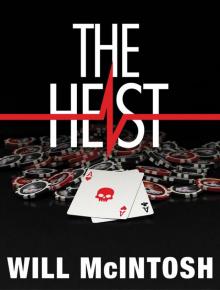 The Heist
The Heist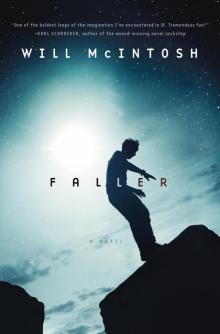 Faller
Faller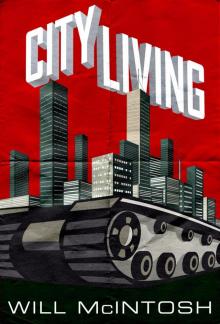 City Living
City Living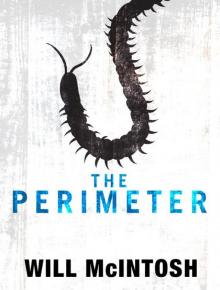 The Perimeter
The Perimeter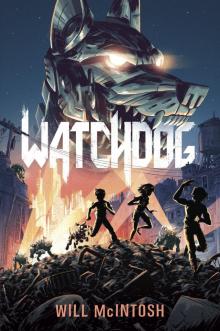 Watchdog
Watchdog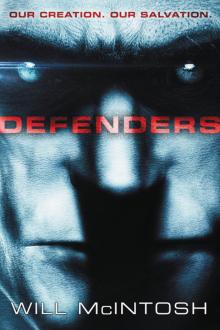 Defenders
Defenders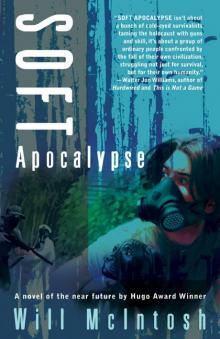 Soft Apocalypse
Soft Apocalypse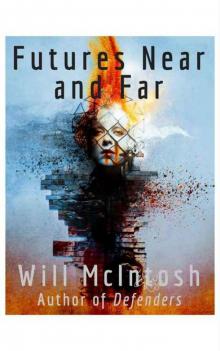 Futures Near and Far
Futures Near and Far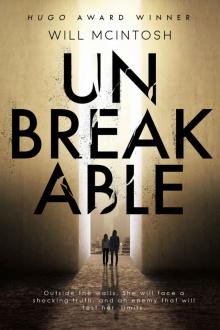 Unbreakable
Unbreakable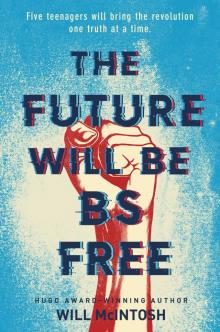 The Future Will Be BS Free
The Future Will Be BS Free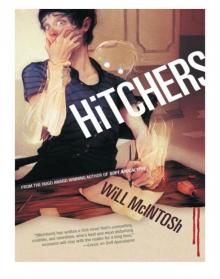 Hitchers
Hitchers Burning Midnight
Burning Midnight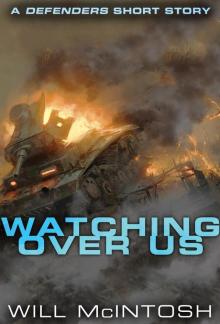 Watching Over Us
Watching Over Us